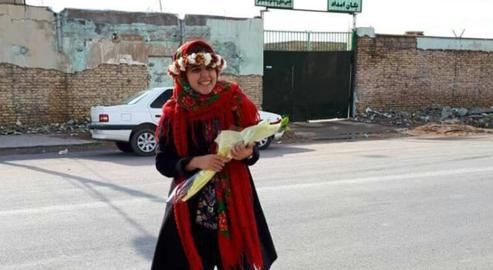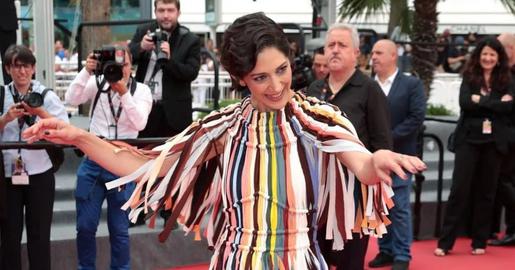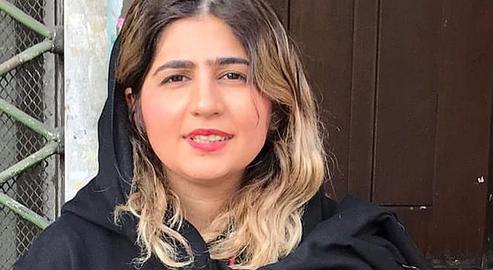Sepideh Gholian is a 23-year-old civil rights activist and journalist who was arrested during the labor protests of Haft Tappeh workers and sentenced to 18 years in prison. Her book, Tilapia Sucks the Blood of Hur al-Azim, tells the story of her detention at the Dezful Intelligence Detention Center and Sepidar Women's Prison in Ahvaz.
In these 19 stories, Gholian paints a meticulous picture of her horrific experience. On one hand, we directly encounter the face of oppression. On the other, we engage with the fates of others whose names, lives and imprisonment might otherwise be doomed to be forgotten and denied.
IranWire has previously published Gholian’s book in its original Persian and is now serialising the collection in English, while its author has been returned to Iran’s notorious Evin Prison. The stories are translated by Zahra Moravvej.
One night I am taken to Makieh.
At dinnertime, the guard raises the volume of the radio, which is playing music. Any sound other than the sound of torture is pleasing.
We are starving! But it isn’t food and water that sustains us, and we don’t shrink because of the food. It’s the voices giving up to something that we are not, and hearing the sound of bones cracking, that has shrivelled us. We starvelings, in cell number 22 of Ahvaz intelligence detention center, miss any voice other than the voices of torture.
It’s Arabic music, which Makieh defines as hazīn: sad. She bursts into tears and I fear her eyes will be pumped dry. She beats herself on chest, crying, "My husband was so sophisticated. His clothes were so stylish. I miss his perfume, oh, my children!"
“Makieh,” I say, “I am sure you’ll be free very soon."
She looks at me and asks, “How can I gather Arif's clothes?"
Makieh is a very intelligent woman. Although she has been repressed all her life, she is very smart. I ask myself, does repression deteriorate intelligence? And I don’t know the answer either. She has light hazel eyes. Her right breast is burned. And she was ashamed to tell me when she was menstruating. Once I heard the interrogator say: “We are aware of everything. For instance, we know how your right breast was burned." Then I heard someone sobbing.
They never talk to me that way. I’m a city woman, not an Arab. While I’m there I understand that while Arabs are forbidden from reciting the Qur’an, they are allowed to read the Nahj al-Balagha: the most famous collection of sermons, letters, tafsirs, and narrations attributed to Imam Ali. It was collected by Ash-Sharif Ar-Radhia, a Shia scholar in the 10th century, and it is considered one of the major works of Shia literature.
To create a stronger bond with Makieh, I lie on her feet. I ask her, “Would you please recite the Sūrat al-Balad?" She is surprised but caresses my hair and recites that Surah. All of this happens in fewer than five seconds.
I am aware of when I fell asleep. In the middle of the night she wakes me up, and tells me that I was screaming. I had dreamed that I was falling off a cliff, wearing a blue dress. I’ve had that nightmare almost every night.
I get up and ask Makieh, "Is today almost over?"
Then I laugh, and she laughs with me. I am dancing, and talking loudly about my memories. She laughs and laughs, and then we sleep.
Suddenly the door is opened. They take both of us. When I return from interrogation, I see her waiting for me. She asks, “Why did it take so long? I returned long before you."
“I don't know. It’s always the same for me."
“I didn't eat dinner,” she says. “I was waiting for you."
We open the food package. It's nearly time for the morning Adhan (call to prayer). The food on Mondays is four pieces of falafel and a small pickle. Makieh asks, "Why doesn't it have pickles?"
“Come on!” I joke. “Did you ask for a pickle? Are you going to tell them you cannot sleep because we are starving? You are so high-maintenance.” As we are laughing, the door opens and they take me for interrogation again.
“Why were you laughing?”
“Pickles... Makieh.”
Makieh is not as poor as she claims. She is lying about going to bed hungry. Since she has asked for pickles after being interrogated, she was not under enough pressure. She didn't change her religion because of her husband's influence because she has a high expectation when it comes to food.
I didn't want to write these things about Makieh, but after being beaten by cables, I was forced to write them by the interrogator. It seems the Arab woman has no right to ask for pickles.....

Footnotes
The Sūrat al-Balad (“The City”) is the 90th chapter of the Qur’an.
Adhan is the morning prayer.
visit the accountability section
In this section of Iran Wire, you can contact the officials and launch your campaign for various problems




















comments